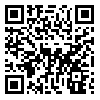Volume 7, Issue 3 (2022)
SJMR 2022, 7(3): 143-150 |
Back to browse issues page
Download citation:
BibTeX | RIS | EndNote | Medlars | ProCite | Reference Manager | RefWorks
Send citation to:



BibTeX | RIS | EndNote | Medlars | ProCite | Reference Manager | RefWorks
Send citation to:
Hassani Bafrani M, Amini Mahabadi A, Hassani Bafrani H. Investigating the Effect of Diet Containing Sesame Seeds on Epididymis and Seminal Vesicles of Adult Wistar Rats. SJMR 2022; 7 (3) : 2
URL: http://saremjrm.com/article-1-270-en.html
URL: http://saremjrm.com/article-1-270-en.html
1- Student Research Committee, Hormozgan University of Medical Sciences, Bandar Abbas, Iran.
2- Responsible for administrative affairs, Payame Noor University, Ardestan, Isfahan, Iran.
3-
2- Responsible for administrative affairs, Payame Noor University, Ardestan, Isfahan, Iran.
3-
Abstract: (1146 Views)
Introduction: Infertility is one of the world's medical problems; about 10-15% of couples have experienced the problem of infertility. In recent years, many efforts have been made to identify a desirable and ideal medicinal plant with a strong anti-metabolic effect and the effect of this plant on male fertility. Sesame is an essential oil seed obtained from the Sesamum indicum plant. This study aimed to investigate the effect of the sesame seed diet on the epididymis and seminal vesicle structure of adult male rats.
Material and methods: The 30 adult Wistar rats weighing 200 gr were obtained from the animal house of Kashan University of Medical Sciences. Mice were randomly divided into two experimental groups (n=15) and control (n=15). The control group received a standard diet and the experimental group received a diet containing 70% of the standard diet and 30% of sesame seeds after weaning for 12 weeks. The right epididymis was removed and crushed into several pieces in a sample bottle containing normal saline for several minutes to allow the sperm to swim out. Sperm parameters, sperm count, and motility were also determined. The left epididymis was divided into three parts and fixed in Bouin's solution for histological evaluation. Also, seminal vesicles were examined after being fixed. The data were analyzed using SPSS software and the t-test. P<0.05 was considered significant.
Results: The average number of cells and sperm motility in the left epididymis in the experimental group was very significant compared to the control (P<0.001). The average diameter of the epididymis of the tubes, lumen and epithelium was not significantly different in the three parts (P>0.05). A significant difference was observed between the treatment and control groups in fibromuscular diameter and seminal vesicle epithelium (P<0.05). The volume density of the seminal vesicle epithelium in the treatment group compared to the control group increased significantly, but the volume density of the fibromuscular gland and the lumen of the seminal vesicle decreased significantly in the treatment group compared to the control group.
Conclusion: Sesame consumption improved sperm motility and number. However, it did not affect epididymal tissue. Therefore, to further investigate this seed on the reproductive system, more studies should be conducted in this field.
Material and methods: The 30 adult Wistar rats weighing 200 gr were obtained from the animal house of Kashan University of Medical Sciences. Mice were randomly divided into two experimental groups (n=15) and control (n=15). The control group received a standard diet and the experimental group received a diet containing 70% of the standard diet and 30% of sesame seeds after weaning for 12 weeks. The right epididymis was removed and crushed into several pieces in a sample bottle containing normal saline for several minutes to allow the sperm to swim out. Sperm parameters, sperm count, and motility were also determined. The left epididymis was divided into three parts and fixed in Bouin's solution for histological evaluation. Also, seminal vesicles were examined after being fixed. The data were analyzed using SPSS software and the t-test. P<0.05 was considered significant.
Results: The average number of cells and sperm motility in the left epididymis in the experimental group was very significant compared to the control (P<0.001). The average diameter of the epididymis of the tubes, lumen and epithelium was not significantly different in the three parts (P>0.05). A significant difference was observed between the treatment and control groups in fibromuscular diameter and seminal vesicle epithelium (P<0.05). The volume density of the seminal vesicle epithelium in the treatment group compared to the control group increased significantly, but the volume density of the fibromuscular gland and the lumen of the seminal vesicle decreased significantly in the treatment group compared to the control group.
Conclusion: Sesame consumption improved sperm motility and number. However, it did not affect epididymal tissue. Therefore, to further investigate this seed on the reproductive system, more studies should be conducted in this field.
Article number: 2
Article Type: Original Research |
Subject:
Sterility
Received: 2023/04/10 | Accepted: 2023/04/10 | Published: 2023/04/10
Received: 2023/04/10 | Accepted: 2023/04/10 | Published: 2023/04/10
| Rights and permissions | |
 |
This work is licensed under a Creative Commons Attribution-NonCommercial 4.0 International License. |




